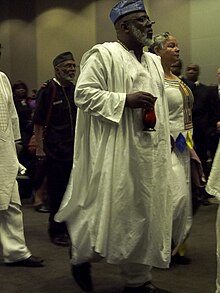Akinyele Umoja
Appearance

Akinyele Umoja (born 1954) is an American educator and author who specializes in African-American studies. As an activist, he is a founding member of the New Afrikan People's Organization and the Malcolm X Grassroots Movement. In April 2013, New York University Press published Umoja's book We Will Shoot Back: Armed Resistance in the Mississippi Freedom Movement. Currently, he is a Professor and Department Chair of the Department of African-American Studies at Georgia State University (GSU).
Quotes
[edit]- The assassination of Caldwell is symbolic of the reign of terror that defeated Reconstruction, democracy, Black political participation, as well as human rights in Mississippi and the South in the mid-1870s. Violence was central to the establishment of White domination, not only to seize power for White supremacists but also to instill fear and intimidation in the Black population and their allies. In a state with a Black majority, to secure White supremacy and to maintain Black labor, particularly rural workers, as a servile labor force, it was necessary to institutionalize fear and intimidation. Men like Caldwell represented hope for Black progress and resistance to White domination.
- We Will Shoot Back: Armed Resistance in the Mississippi Freedom Movement. NYU Press. 22 August 2014. p. 12. ISBN 978-1-4798-8603-6.
- During the 1870s, Black political participation was the primary motivation for White supremacist violence. Black political participation accounted for 83 percent of the recorded mob violence of the period. The federal government allowed its southern adversaries back into the union through the violence, terror, and disenfranchisement of people of African descent. The U.S. government and national Republican Party proved unreliable allies as valiant men like Caldwell were assassinated, Black political officials were deposed, and the Black masses were forced into agrarian peonage. With the Hayes-Tilden Compromise of 1877, any pretense of federal intervention in Mississippi and the former Confederacy was dropped for decades. A war was waged in the South to place emancipated Blacks, in the words of Du Bois, "back towards slavery." Terrorist violence was unleashed to secure the White planter elite in power and to perpetuate a system based on White supremacy. The specter of violence remained as a means of intimidation and social control. In the decades following Reconstruction, lynching became common in the state. Between 1882 and 1940, 534 Black people were lynched in Mississippi—the highest total in the United States during that period. The federal government ignored terrorism waged against Black people: "Congress and the president took no action to prevent lynching, and the federal government did not prosecute the perpetrators, even when the event was publicized at least a day in advance." With White supremacist violence as a major vehicle used to intimidate and suppress, within decades Blacks were excluded from representation and participation in electoral politics and apartheid was institutionalized in civil society.
- We Will Shoot Back: Armed Resistance in the Mississippi Freedom Movement. NYU Press. 22 August 2014. p. 16. ISBN 978-1-4798-8603-6.
- Another Belzoni activist would be attacked by White supremacists months later. Belzoni NAACP leader, entrepreneur, and grocer Gus Courts was warned after the murder of Lee that he would be "next on the list to go." Courts was distinguished from his peers by organizing a contingent. of Humphreys County Blacks to pay their poll taxes and register to vote in 1953. After being harassed by the Humphreys County Citizens' Council, Courts appealed to the state government for protection. Instead of receiving protection, Courts was confronted in his store by a local Citizens' Council member who possessed a copy of his letter appealing for protection. After the November 1955 elections, Courts was shot in his store. Friends took the wounded Courts two counties away to the hospital in Mound Bayou, due to concerns about the care Lee received in the Belzoni hospital after his assault. Courts recovered from the attack in Mound Bayou. Following advice from Medgar Evers, Courts decided to leave the state. Escorted by an armed Evers, Courts fled the Delta to Jackson. After stints in Texas and California, Courts and his family would eventually move to Chicago. An FBI investigation of the Courts shooting ended with no arrests. In Chicago, Courts was clearly a political exile of Mississippi apartheid. During a 1968 interview, Courts reflected, I had to leave my $15,000 a year grocery business, my trucking business and my home and everything—my wife and I—thousands of us Mississippians had to run away. We had to flee in the night. We are American refugees from the terror in the South all because we wanted to vote.
- We Will Shoot Back: Armed Resistance in the Mississippi Freedom Movement. NYU Press. 22 August 2014. pp. 34-35. ISBN 978-1-4798-8603-6.
External links
[edit]- Akumoja.com (Official website)
- Professor Akinyele K. Umoja Archived 2016-03-03 at the Wayback Machine gsu.edu
- Muhammad Speaks Interviews Dr. Akinyele Umoja, Part 1
- CNN interview with Dr. Akinyele Umoja
- Akinyele Umoja at Google Scholar
- Akinyele Umoja at ResearchGate
- Akinyele Umoja at Academia.edu
- Akinyele Umoja at JSTOR


